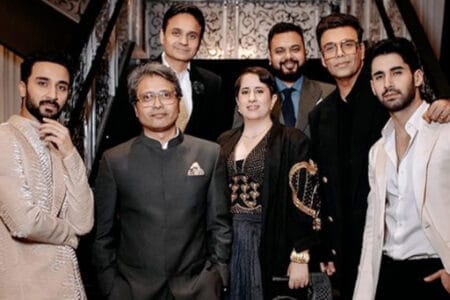TIFF 2023 Movie Review: ‘In Flames’

I have always believed that living in Karachi is like simultaneously living through a miracle and a nightmare, one always lurking in the background of the other, fighting for its moment in the spotlight. Mariam (Ramesha Nawal), our heroine of ‘In Flames’, experiences life in the city somewhat the same way.
After the death of her grandfather, Mariam is left to console and guide her mother through the grief. Her medical college is her refuge, where she hopes for a career, a partner, a better future. But an accident turns her life upside down. The freedom from a family patriarch becomes a burden to protect her own home. The bliss of young love becomes a haunting reminder of her guilt. The urge to right her wrongs becomes the biggest mistake she could’ve made.
Director Zarrar Kahn chooses to (rightfully) depict this dichotomy as a psychological thriller. What women go through in Pakistan is objectively horrifying, so how else to accurately portray the experience? Seemingly innocuous phrases from the mouth of supposedly well-meaning men make chills run down your spine. Supposedly straightforward questions make you as defensive as they do Mariam. Kindness always feels suspicious. The movie does a superb job at showing how women hear these words, how they interpret these gestures. But what Nawal does best is show the absolute fatigue associated with all of this. Her fear and caution isn’t new. It’s been learnt, inherited from her mother, and possibly from the generations of women before her. Each moment of joy she experiences is quite literally haunted by guilt and trauma. But she barely flinches. As she tells her boyfriend Asad (Omar Javaid) in a moment of honesty, “Kuch zakhm kabhi nahi bharte, sehna seekh jaate hain.” (Some wounds never heal, we learn to endure them.)
‘In Flames’ is a stunning film. There are scenes where the city meets sea, luring Mariam into its rhythmic waves, the sand between her toes, the salt in the air. You feel scared for her, but it’s all so beautiful. Maybe it’s okay to seek refuge in madness, you think, we’ve all done it at some point, to cope. The relatability is validating, it gives us something to point at and say “Look! This is what we’ve been screaming about for years!”. But, on the other hand, it’s frustrating to see that the conversation hasn’t moved beyond acknowledgement, from our TV serials to some of our most path-breaking works being presented on global stages. What use is this validation when the burden of change still lies on our shoulders? Sure, our society may need to hear this 100 times more before they feel alarmed enough to do anything about it, but as a woman who is a part of that society, it feels a little tedious. I shouldn’t feel envy seeing Mariam float worry-free on Karachi’s beaches. I shouldn’t be flinching when the Maulvi sahab asks “Is she married? Why not?”. But when even the kindest of men, like Asad, aren’t willing to fully comprehend the life-changing consequences each tiny decision we make can have on our whole lives, who do we look to for allyship? How do we let ourselves continue to pursue joy when the cost is so high, and we are the only ones who have to pay it?
Related to this
TIFF 2023 Movie Review: ‘The Queen of My Dreams’
The story does end in triumph, to the film’s credit. Mariam and her mother Fariha (Bakhtawar Mazhar) do persevere. They cleanse themselves of the guilt associated with self-preservation, turning the weight of upholding patriarchy into ashes after a house fire. But after spending an hour and a half invoking our wrath, that doesn’t feel enough. I wanted to see the whole city burn.
Rating: 3.5/5











